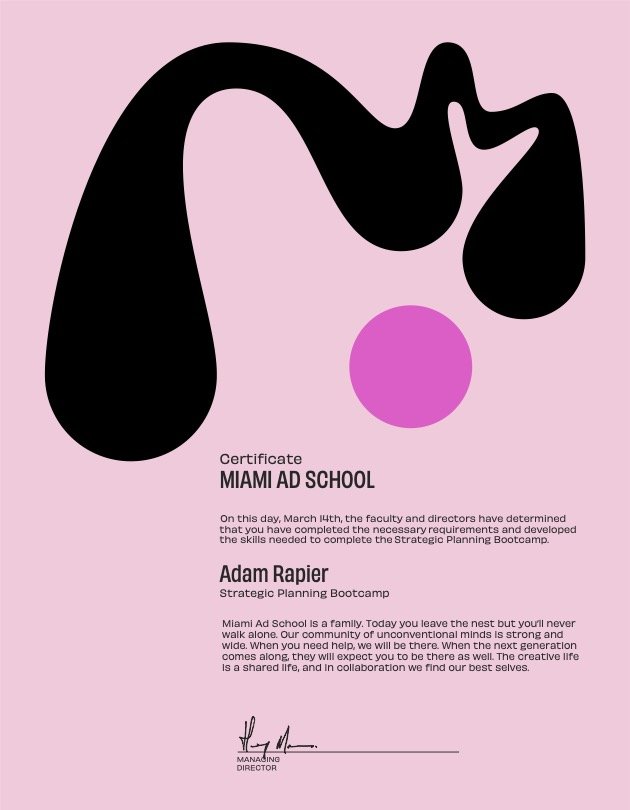Strategic Planning Bootcamp: Miami Ad School
Why?
I chose the Strategy Bootcamp at Miami Ad School to deepen my strategic thinking in advertising and build a strong foundation for crafting impactful campaigns. Focusing on brand strategy, consumer insights, and cultural analysis, I learned to translate research into actionable campaign direction. I also honed my skills in writing clear creative briefs, aligning creative work with client goals.
The program was conducted remotely, with classes scheduled after 5 pm, which mirrored the realities of working in an industry where clients and teams collaborate across multiple time zones and around the world. This structure allowed me to work alongside my classmates, all industry professionals, providing real-world insights while strengthening my ability to manage time and collaborate effectively in a dynamic, global environment. bit.ly/4i4xsB6
What I Learned:
Week 1: Thinking Strategically: Creative Briefs
Week 2: Research & Insights: Learning Plan
Week 3: Defining The Problem: Navigating Solutions (Symptoms vs Problems)
Week 4: Brand Architecture: Brand blueprints/models (Brands are memories)
Week 5: Power of a Good Briefing: Planning experiences (Good briefing > Good brief)
Week 6: Comms Planning: Journey Mapping
Week 7: Owning The Process: Facilitating the creative process (Taking responsibility)
Week 8: Pitching is Storytelling: Engaging Presentations (Facts don’t stick, stories do!)
Week 9: Measuring Effectiveness: Did the work work? (Reproducibility)
Week 10: Owning Your Career: Your portfolio is you
Project Management Certificate: Cornell University College of Engineering
Why?
I pursued a Project Management certification through Cornell to deepen my understanding of the behind-the-scenes work involved in executing an advertising campaign. Beyond creative engagement, I wanted to strengthen my ability to manage the logistics and strategic planning that drive a campaign’s success from concept to completion. bit.ly/4epn6uh
What I Learned:
Effective Project Planning: The ability to break down complex projects into manageable phases translates to creating detailed campaign roadmaps, ensuring all aspects—creative development, media buying, and client revisions—are on track and aligned with the timeline. This approach allows me to ensure each department stays in sync and delivers on time.
Resource Allocation and Scheduling: Learning to allocate resources efficiently and create precise timelines in the program directly translates to managing teams across creative, production, and media. I can balance the workload and ensure every part of the campaign progresses smoothly, with team members working within the constraints of the project scope and budget.
Risk Management: The risk management strategies I learned in the program apply directly to identifying potential setbacks in advertising campaigns—whether they’re due to client feedback, delays in creative approval, or unforeseen external factors. I can proactively mitigate risks, allowing me to keep projects on track and avoid costly issues.
Agile Methodologies: The agile principles I learned translate well into the advertising space, where priorities often shift quickly. I can now lead campaigns with flexibility, adapting strategies or deliverables as client needs or market conditions change, ensuring the campaign stays effective while maintaining its creative integrity.

